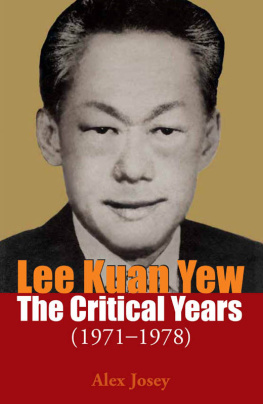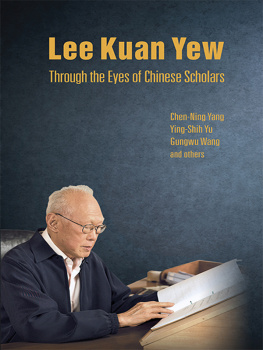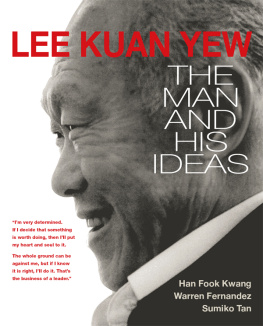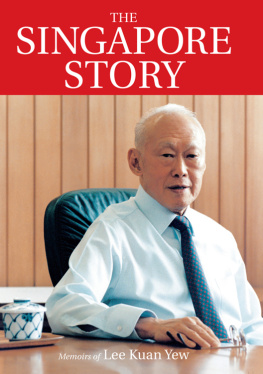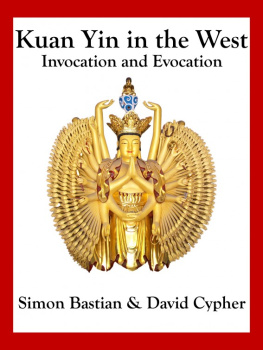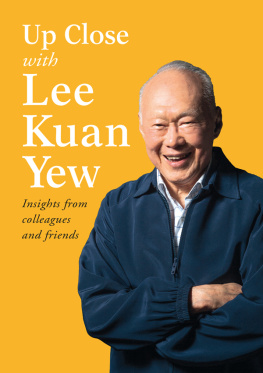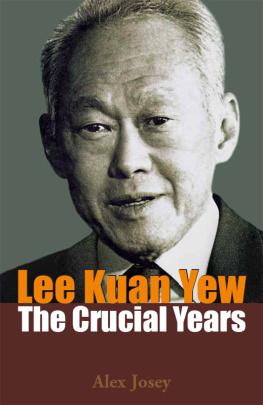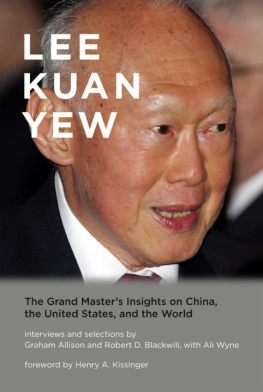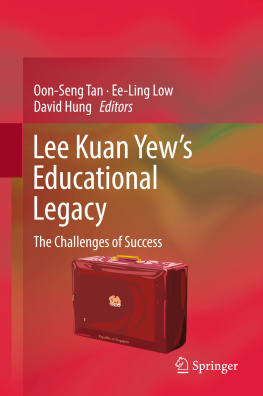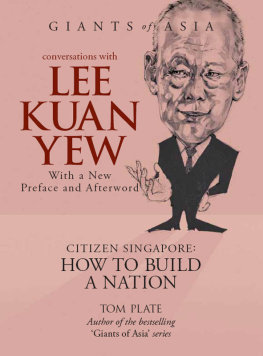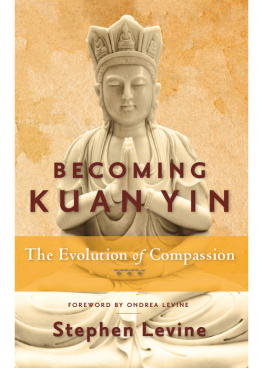Lee Kuan Yew played the pivotal role in Singapores transition from British Crown Colony to independent developing nation, and on to the economically powerful and diplomatically influential city-state it is today. Throughout this surprising and at times painful journey, he has proved a charismatic and occasionally controversial leader. Lee is a conviction politician whose speeches are unambiguous, characterful and eminently quotable; this collection of almost 600 short quotations provides a compelling summary of his views on a wide range of topics from Singapores past, present and future.
Lee began his political career while Singapore, having suffered the deprivations of Japanese occupation during World War II, was extricating itself from British control before establishing itself as a separate nation from Malaysia. Racial tensions were high, communism was gaining a foothold in Southeast Asia, and the economic challenges to a small, largely undeveloped island were enormous. Lees views on the issues of this time still resonate today.
Singapores ties to Britain continued to be strong, and Lee watched closely as many European countries developed into welfare states. He rejected this economic model out of hand, and spoke forcefully about entrepreneurship, labour relations and economic development.
As Singapore became more developed and affluent, and mass communications connected all the worlds peoples, Lee spoke often of the Asian values which he believed gave Singapore an important advantage both socially and economically. Ever conscious of the countrys multicultural population, he also spoke from the heart on the benefits and disadvantages of bilingualism.
Lees pragmatism and unwillingness to be influenced by external pressures characterized his leadership style: I was never a prisoner of any theory. What guided me were reason and reality. The acid test I applied to every theory or scheme was, would it work?
Although Lee stepped down as Prime Minister in 1990, his opinions are still keenly sought out in Singapore, in ASEAN and indeed across the globe. Whether he is talking about the environment, corruption, democracy or the worlds future, his voice is one that few can ignore.
The quotations found in this book have largely been selected from Lees public speeches and statements, which have been collected in Singapores National Archives and the Singapore Parliamentary Record.
ON SINGAPORE
Those of us who sometimes talk of unity and confederation do not understand that Singapore is the shop window of Malaya. This is the little place where people come and do their buying and their selling. This is also the little laboratory where the British, the nationalists and the communists first try out their tactics, because if anything goes wrong, it goes wrong on a small scale.
1956
* * *
Before one has a nation, there must be two things. First, the content of a common people with a common identity of interest, a common social experience. And, secondly, complete freedom to exercise the collective will. One may precede the other.
1960
* * *
I do not pretend to be able to solve the problem of agricultural land in Singapore. It is one of those problems which are basically unsolvable. If we succeed as the industrial base in Malaysia, as we may well do in the next decade, then there is no place for either grazing land or agricultural land in the popularly understood sense of that term. Singapore is an industrial city, and the price of land is being determined on the basis of a developing industrial complex.
1964
* * *
To sit on a stool is more comfortable and stable than to sit on a shooting stick. Right? Now we are on a shooting stick. But I intend to sit on that shooting stick and since that is all that I have got 214 square miles we will jolly well make it a strong shooting stick. You have seen Singapore, the people here? It is a shooting stick made of steel.
1965
* * *
In other parts of the world, when their pigs suffer from swine fever, they hush it up. They pretend they do not have it. Net result: all pigs get infected, the position becomes permanently chronic. We can do likewise. But we will become permanently a chronic society: sick. So when we get swine fever, we announce it, alert everyone, so that we can arrest the spread of the disease and bring back normalcy. This is what is required of this community: all the time, that push, that thrust to counter the natural sluggishness which this climate tends to build into our physical systems, and all that while, we must have an awareness of the realities of life.
1967
* * *
We have created this out of nothingness, from 150 souls in a minor fishing village into the biggest metropolis 2 degrees north of the equator. There is only one other civilisation near the equator that ever produced anything worthy of its name. That was in the Yucatan Peninsula the Mayan Civilisation. There is no other place where human beings were able to surmount the problems of a soporific equatorial climate. You can go along the equator or 2 degrees north of it, and they all sleep after half past two if they have had a good meal. They do! Otherwise, they must die earlier. It is only in Singapore that they dont. And there are good reason for this. First, good glands, and second, good purpose.
1967
* * *
Nobody here dies of starvation. Nobody is allowed to beg in streets. When we find someone begging, we put him into a home and feed him. And, in two to three years, with all our cleansing services reorganised, we will make this one of the cleanest and most beautiful cities in Asia with trees, flowers and shrubs in all the public places.
1967
* * *
Few countries in Asia or Africa have taken over from European colonial administrations, and improved on what they had. We have been able to do this because we have never been afraid to face up to our problems and to tackle them with vigour.
1968
* * *
Between Japan and Europe, we must make Singapore the best place to bunker and repair ships, either in drydock or on water. Once we have established ourselves as the ship repairing and shipbuilding centre, we will remain so for a very long time. For once supremacy has been established, whether it is an airport, a harbour, or a dockyard, it is very difficult for any other place to dislodge us. For others have to compete against an established centre with superior facilities, higher skills and expertise, and long-standing established customers.
1971
* * *
Hard-headed industrialists and bankers of developed countries never take unnecessary risks. They look round the world for places where there is political stability and industrial peace before they invest. In Singapore they find such a place. Hence the massive inflow of capital, machinery, technological know-how and banking expertise.
1972
* * *
We do not intend to let the population drift away from the city centre because of the high price of land. It would be wasteful to have such a city. We must retain that unique feature of the Singapore that we have known for so long, a city bustling with life from the crack of dawn to past midnight, one which throbs with life and vitality.
1976
* * *
We are not Britain. We cannot be Britain. Remember that.
1976
* * *
Why do you think pregnant women want to come to Singapore to give birth? Because then the child can become a Singapore citizen, isnt it? Then you are entitled to jobs, schooling, jobs, medical attention the whole works. Surely, that is a back-handed tribute to the society that we have built up.



